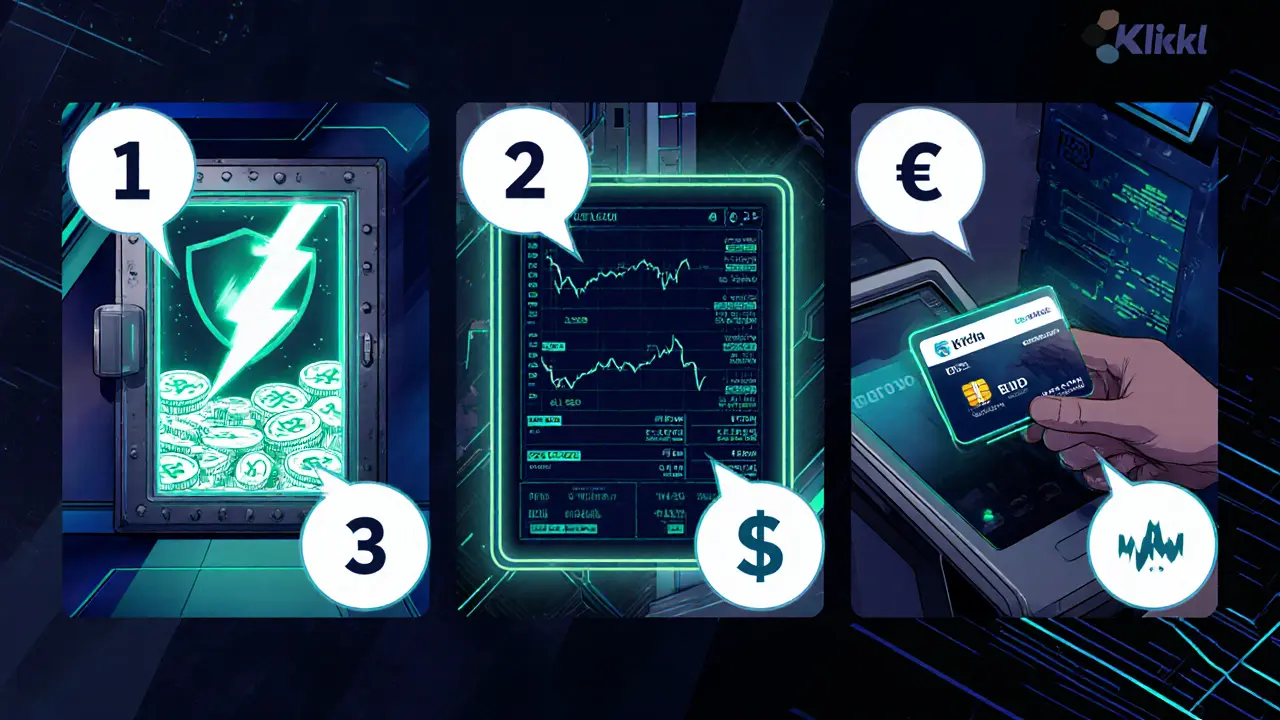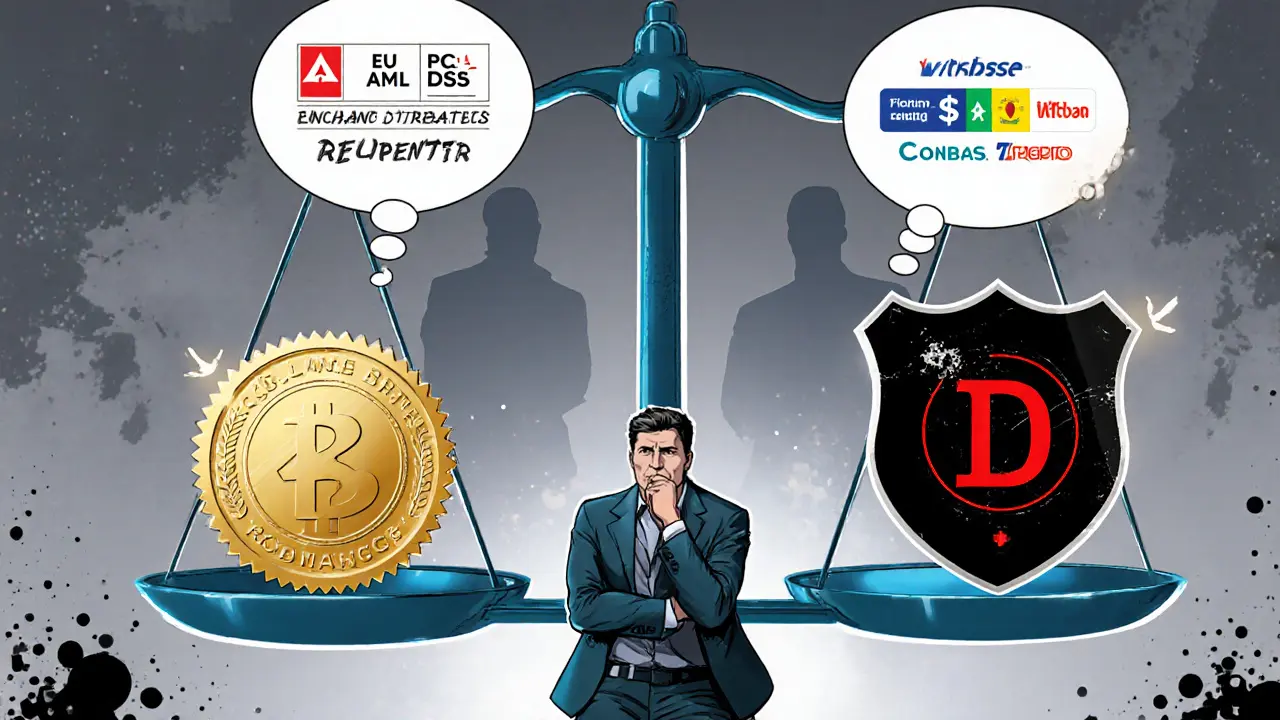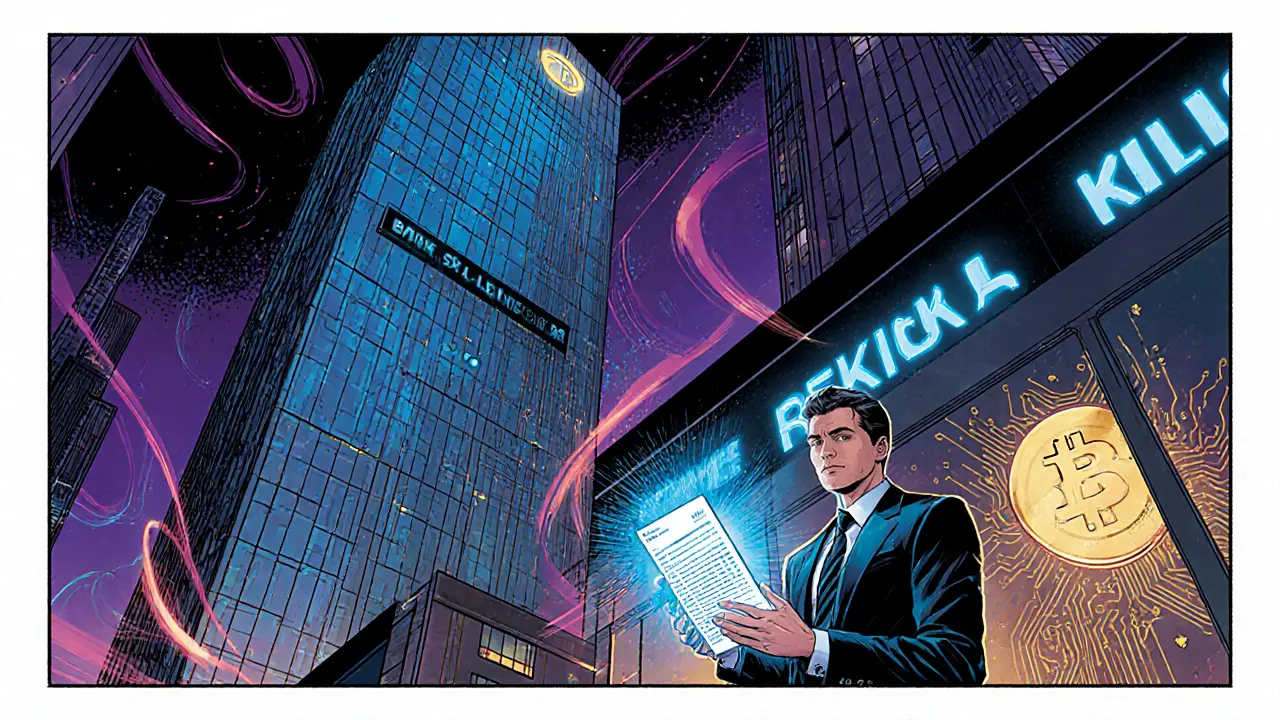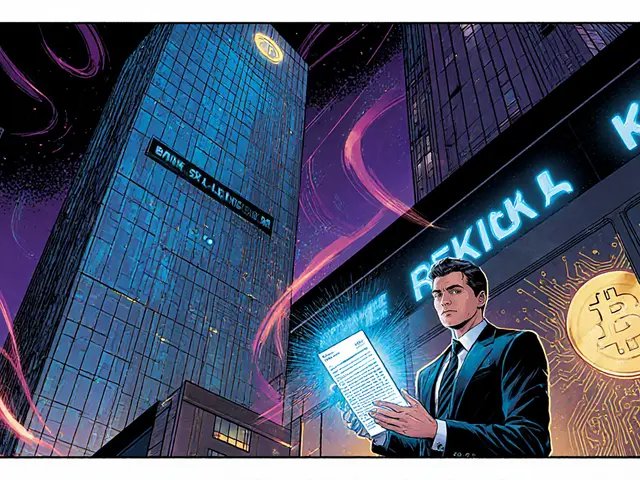Klickl Trading Fee Calculator
Calculate Your Trading Fees
Fee Calculation
Enter trade details to see fee calculation
Key Takeaways
- Klickl blends a regulated bank environment with a full‑stack crypto exchange.
- It offers custody, payments, virtual IBANs, and co‑branded cards in one platform.
- Security rating is D (24%) on CER.live; no public bug‑bounty program.
- PCI DSSv4.0.1 certified, AML/KYC compliant under EU and ADGM rules.
- Best for institutional partners or businesses needing an all‑in‑one Web3 banking suite.
What Is Klickl?
When you hear the term Klickl crypto exchange, picture a hybrid of a traditional bank and a modern crypto marketplace. Klickl is a Web3 open‑banking platform that operates as a regulated PayFi ecosystem, bridging fiat banking services with digital‑asset trading. Founded over eight years ago and headquartered in AbuDhabi, Klickl is supervised by the Financial Services Regulatory Authority (FSRA) of the Abu Dhabi Global Market (ADGM). In Europe it’s also registered in Poland’s virtual‑currency register (entryRDWWW‑930) and follows the EU’s AML‑5 directive (Directive2015/849).
Core Services Offered
Klickl markets itself as a one‑stop shop for every crypto‑related need. Below are the headline features:
- Custody: Bank‑grade, insured storage for over 100 digital assets, with both hot and cold‑wallet options.
- Trading: Spot, OTC, and contract trading under a single UI. Execution speeds claim sub‑second latency.
- Payments & Settlement: Integrated fiat‑to‑crypto gateway, virtual IBANs for every user, and cross‑border settlements using USDT/USDC stablecoins.
- Card Issuance: Co‑branded debit cards that draw from crypto balances, plus encrypted POS support for merchants.
- SaaS for Businesses: A “Shopify for digital assets” that lets partners launch crypto‑based services on Klickl’s modular stack.

Security, Compliance, and Certifications
Klickl leans heavily on its regulatory pedigree. It holds a PCI DSSv4.0.1 certification - the same standard that secures major card networks. The certification, confirmed by ATSEC’s compliance report, proves that Klickl’s payment engine meets the latest encryption, tokenisation, and access‑control requirements.
On the AML front, the platform runs a risk‑based KYC workflow that verifies identity documents, source‑of‑funds checks, and ongoing transaction monitoring. This aligns with both ADGM’s AML framework and the EU’s AML‑5 rules.
However, third‑party security assessments paint a mixed picture. CER.live rates Klickl with a D (24%) security score, citing the lack of a public penetration‑test report and an absent bug‑bounty program. The exchange states that its internal red‑team conducts regular audits, but independent verification is still missing.
Fees and Trading Costs
Fee structures are transparent but vary by product:
- Spot trades: 0.10% maker / 0.15% taker.
- OTC desk: negotiated spreads, typically 0.20%‑0.30% for volumes under $5M.
- Contract futures: 0.05% maker / 0.10% taker, plus a 0.02% funding fee per 8‑hour interval.
- Withdrawal fees: flat 0.0005BTC or equivalent for crypto; €2 for SEPA fiat withdrawals.
- Deposit fees: free for most fiat methods; 0.001% for crypto deposits.
Unlike many unregulated platforms, Klickl does not charge hidden network fees - each transaction shows the exact cost before confirmation.
The KLK Utility Token
At the heart of Klickl’s ecosystem sits the KLK token. It has a fixed supply of 1billion tokens, governed by the KLK Foundation. KLK functions in three main ways:
- Governance: Token holders vote on protocol upgrades and fee‑rebate proposals.
- Staking: Users can lock KLK to earn up to 8% annual yield, which is sourced from platform fees.
- Network Rewards: Developers and partners receive KLK for building modules on the Klickl stack.
The token is listed on a handful of mid‑cap exchanges and can be used to pay reduced fees on Klickl’s platform (10% discount for staking‑qualified accounts).
How Klickl Stacks Up Against the Competition
| Feature | Klickl | Binance | Coinbase |
|---|---|---|---|
| Regulatory Oversight | ADGM FSRA, EU AML‑5, PCI DSS | Self‑regulated, limited licenses | US FinCEN, EU MiCA pending |
| Custody Type | Bank‑grade insured hot + cold wallets | Cold storage for most assets | Cold storage, insured for US users |
| Security Rating (CER.live) | D - 24% | A - 92% | A‑ 88% |
| Spot Fees (maker/taker) | 0.10% / 0.15% | 0.10% / 0.12% | 0.50% flat |
| Fiat‑to‑Crypto Bridge | Virtual IBANs, multi‑currency settlements | Limited (USD, EUR) | Direct bank transfers (US, EU) |
| Business SaaS Offering | Full modular stack (Shopify‑style) | Binance Cloud (limited) | Coinbase Cloud (API only) |
The table shows that Klickl’s biggest advantage is regulatory depth and the all‑in‑one banking suite. Its downside is a weaker security rating and a smaller asset list compared with the market giants.

Pros and Cons
Pros
- Regulated under ADGM and EU AML frameworks - a rare combo for crypto exchanges.
- Integrated fiat services (virtual IBAN, co‑branded cards) simplify cross‑border payments.
- Modular SaaS platform lets businesses launch crypto products quickly.
- PCI DSS certification demonstrates mature payment‑security practices.
Cons
- D security score on CER.live; no public bug‑bounty program.
- Liquidity is lower than top‑tier exchanges, which can affect large trades.
- KLK token is not widely listed, limiting on‑ramp options.
- Interface feels more “bank portal” than “trader’s dashboard,” which may deter hobbyist traders.
Who Should Use Klickl?
If you run a fintech startup, a crypto‑rich enterprise, or need a regulated custody partner, Klickl’s full‑stack offering saves you from stitching together multiple providers. Retail traders who value deep liquidity and a battle‑tested security suite might stick with Binance or Coinbase instead.
Final Verdict
Klickl positions itself at the intersection of banking and blockchain. Its regulatory credentials and all‑in‑one service model are compelling for businesses and institutional investors. The trade‑off is a modest security rating and a narrower market footprint for retail users. In short, choose Klickl if you need a compliant, bank‑like experience; choose a mainstream exchange if you prioritize liquidity and a robust security reputation.
Frequently Asked Questions
Is Klickl safe for storing large crypto balances?
Klickl offers insured custody and complies with ADGM’s banking standards, which is a strong safeguard. However, the CER.live D rating indicates the platform lacks a public penetration test and bug‑bounty program, so using a hardware wallet for the bulk of your holdings is still recommended.
What fiat currencies can I deposit on Klickl?
Klickl supports USD, EUR, GBP, and AED via its virtual IBANs. Additional currencies are added periodically, and all fiat deposits go through AML‑checked bank partners.
How does the KLK token reduce trading fees?
Staked KLK holders receive a 10% discount on spot and contract fees. The discount applies automatically when the staking balance meets the required threshold (minimum 5,000KLK).
Can I integrate Klickl’s services into my own app?
Yes. Klickl provides RESTful APIs and SDKs for iOS, Android, and web. The modular architecture lets you plug in only the services you need - payments, custody, or trading.
What happens if I send crypto to the wrong address?
Klickl’s user agreement states it cannot recover funds sent to an incorrect address, mirroring standard blockchain practice. Always double‑check the destination before confirming a transaction.



Anjali Govind
October 12 2025Looks like Klickl has a decent fee calculator, nice work!
Sanjay Lago
October 19 2025Yo, I tried the spot‑trading fee calc and it’s pretty smooth, but I wish the UI had a dark mode – it’d save my eyes during those late‑night trading sessions. Also, if you could add a tooltip for the KLK token discount, that’d be epic. Keep it up!
Annie McCullough
October 26 2025Yo fam this exchange’s fee structure is basically Tier‑1 liquidity aggregator on‑chain, low‑latency order book matching 😎 the API endpoints return JSON with micro‑second timestamps, which is dank for HFT bots. But the gas‑fee overlay on withdrawals feels like a hidden slippage cost you gotta watch out for.
Carol Fisher
November 2 2025Honestly, any platform that pretends to be “global” but hides US‑based compliance is just a copy‑cat of Silicon Valley hype 🇺🇸🚀. If Klickl wants real security, they should adopt the same standards as the NYSE and enforce KYC like a proper American exchange.
Melanie Birt
November 9 2025Klickl’s fee calculator is a good start, but you need to consider a few hidden costs. First, the maker‑taker spread can vary depending on liquidity pools, so the displayed fee might not reflect the actual execution price. Second, staking KLK for a 10% discount is only worthwhile if you hold a significant amount; otherwise the opportunity cost of locking your tokens can outweigh the fee savings. Third, their OTC desk charges a flat surcharge on top of the displayed rate, which isn’t clearly shown in the UI. Fourth, withdrawals still incur blockchain network fees, which can spike during congestion. Fifth, the platform claims “military‑grade” security, but independent audits are still pending, so keep an eye on the audit reports. Finally, always test the calculator with a small trade before committing large volumes.
Lady Celeste
November 16 2025Another “review”, how original.
Scott Hall
November 22 2025Honestly, I think the UI feels pretty clean, and the fee breakdown is transparent enough for a casual trader. The only thing I’d tweak is adding a quick “estimated total cost” line so users don’t have to do mental math.
Jade Hibbert
November 29 2025Oh wow, a “quick line” – what a groundbreaking suggestion, Scott. Maybe next they’ll invent a button that actually executes the trade for you.
Hanna Regehr
December 6 2025I’ve been using Klickl for a few weeks now, and the futures module is surprisingly stable. The margin calls are clear, and the liquidation engine respects the price feed without weird flash‑crash anomalies. Still, the API rate limits feel a bit low for professional algo traders.
hrishchika Kumar
December 13 2025Hey folks, just wanted to add that the feeling when you finally see that “KLK token staked” toggle light up is like finding a hidden spice in a curry – it adds that extra zing to the fee savings! 🌶️ Also, the support team uses a mix of Hindi and English which makes the communication feel homely for Indian users.
Lena Vega
December 20 2025Appreciate the cultural note, it does make onboarding smoother.
Laura Myers
December 27 2025So the “military‑grade” claim is just marketing fluff, right? I saw a thread where a user lost funds due to a “phantom” withdrawal bug. 😱 The whole thing feels like a drama waiting to happen.
Manas Patil
January 3 2026From a technical standpoint, Klickl’s architecture leverages a hybrid off‑chain order matching engine coupled with on‑chain settlement via smart contracts. This design reduces latency but introduces a trust‑boundary at the off‑chain layer, which deserves scrutiny.
Ethan Chambers
January 10 2026Ah, the classic “hybrid” buzzword parade. One would think a platform touting “off‑chain matching” is simply trying to mask latency issues while keeping the veneer of decentralization. Let’s see if they ever publish a whitepaper that isn’t just a collection of vague platitudes.
gayle Smith
January 17 2026Honestly, Ethan, you sound like you’ve never actually used an exchange. Your snark won’t make the code any better. Maybe try logging in before you throw shade.
mark noopa
January 24 2026When we contemplate the nature of trust in a digital marketplace, we must first interrogate the epistemology of “security” that platforms like Klickl proclaim. The assertion of “military‑grade encryption” is a rhetorical device, a metaphor that clouds the concrete mechanisms such as TLS versions, multi‑signature wallets, and hardware security modules. One might argue that true security is not a single layer but a lattice of interlocking safeguards, each subject to human error and systemic risk. The fee calculator, while elegant in its UI, abstracts away the stochastic volatility of network gas fees, leading users to a false sense of determinism. Moreover, the staking discount for KLK tokens introduces an economic incentive that can be weaponized by whales who manipulate token price to capture fee rebates. The underlying smart contracts, if not audited by multiple independent firms, remain a black box-an ontological void where hidden bugs may lurk. In addition, the platform’s compliance framework, often touted as “KYC‑friendly”, can become a vector for privacy erosion if data silos are breached. From a philosophical lens, the very act of delegating financial sovereignty to a centralized exchange raises questions about agency and autonomy. The interface’s sleek design masks the complexity of order‑book depth, slippage, and order routing, which are critical variables for sophisticated traders. Users must therefore develop a mental model that reconciles the superficial simplicity with the underlying market microstructure. Failure to do so may result in “fee shock” when hidden costs surface during periods of network congestion. It is also pertinent to note that the platform’s support ecosystem, though multilingual, occasionally suffers from delayed response times, which can exacerbate user anxiety during critical market events. Ultimately, the decision to engage with Klickl should be predicated on a holistic risk assessment that accounts for technical, economic, and psychological dimensions. By embracing a nuanced perspective, traders can navigate the terrain with both confidence and humility, acknowledging that no system is immune to imperfection.
Rama Julianto
January 31 2026This philosophical ramble is nice, but the bottom line is that unless Klickl patches its smart‑contract audit gaps, it’s a ticking time bomb. Stop whining and demand real security now.
Helen Fitzgerald
February 7 2026Great analysis, Mark! For newcomers, try breaking down each section of your post into bite‑size takeaways – that way you can apply the insights without feeling overwhelmed.